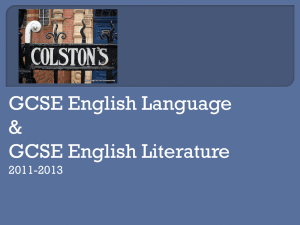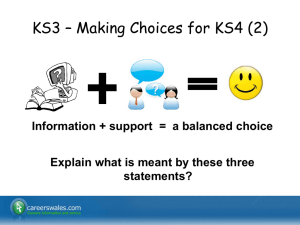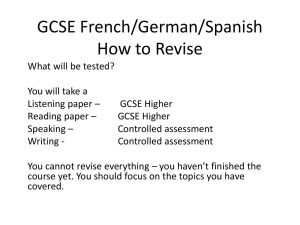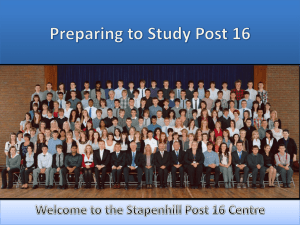Overview - Trinity School Nottingham
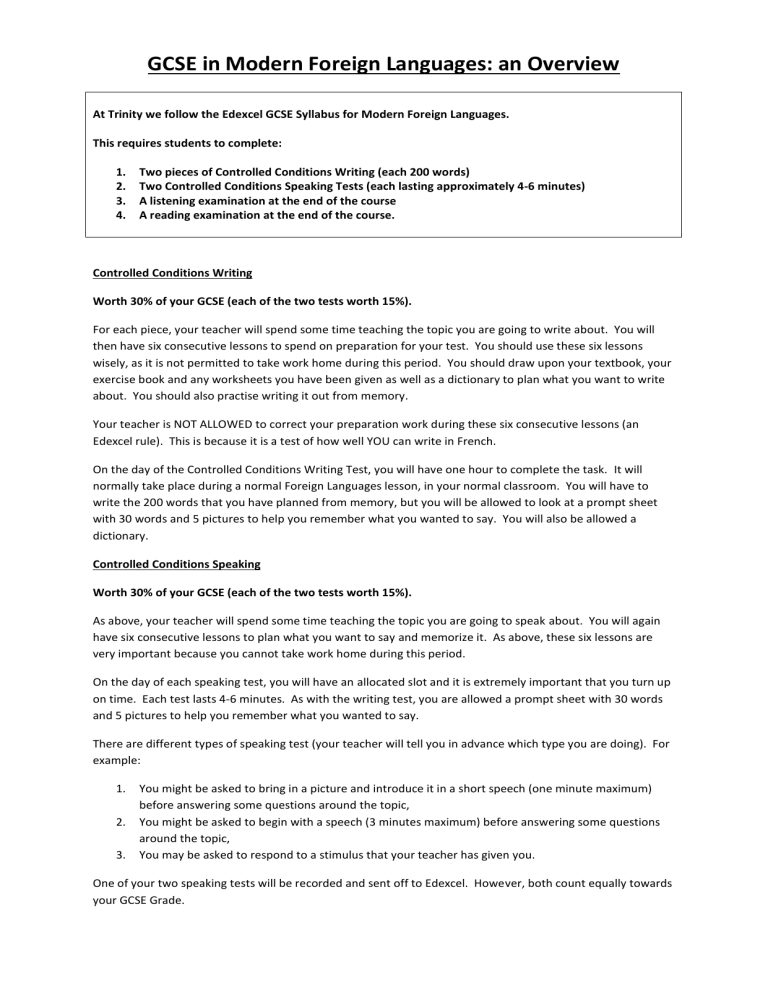
GCSE in Modern Foreign Languages: an Overview
At Trinity we follow the Edexcel GCSE Syllabus for Modern Foreign Languages.
This requires students to complete:
1.
Two pieces of Controlled Conditions Writing (each 200 words)
2.
Two Controlled Conditions Speaking Tests (each lasting approximately 4-6 minutes)
3.
A listening examination at the end of the course
4.
A reading examination at the end of the course.
Controlled Conditions Writing
Worth 30% of your GCSE (each of the two tests worth 15%).
For each piece, your teacher will spend some time teaching the topic you are going to write about. You will then have six consecutive lessons to spend on preparation for your test. You should use these six lessons wisely, as it is not permitted to take work home during this period. You should draw upon your textbook, your exercise book and any worksheets you have been given as well as a dictionary to plan what you want to write about. You should also practise writing it out from memory.
Your teacher is NOT ALLOWED to correct your preparation work during these six consecutive lessons (an
Edexcel rule). This is because it is a test of how well YOU can write in French.
On the day of the Controlled Conditions Writing Test, you will have one hour to complete the task. It will normally take place during a normal Foreign Languages lesson, in your normal classroom. You will have to write the 200 words that you have planned from memory, but you will be allowed to look at a prompt sheet with 30 words and 5 pictures to help you remember what you wanted to say. You will also be allowed a dictionary.
Controlled Conditions Speaking
Worth 30% of your GCSE (each of the two tests worth 15%).
As above, your teacher will spend some time teaching the topic you are going to speak about. You will again have six consecutive lessons to plan what you want to say and memorize it. As above, these six lessons are very important because you cannot take work home during this period.
On the day of each speaking test, you will have an allocated slot and it is extremely important that you turn up on time. Each test lasts 4-6 minutes. As with the writing test, you are allowed a prompt sheet with 30 words and 5 pictures to help you remember what you wanted to say.
There are different types of speaking test (your teacher will tell you in advance which type you are doing). For example:
1.
You might be asked to bring in a picture and introduce it in a short speech (one minute maximum) before answering some questions around the topic,
2.
You might be asked to begin with a speech (3 minutes maximum) before answering some questions around the topic,
3.
You may be asked to respond to a stimulus that your teacher has given you.
One of your two speaking tests will be recorded and sent off to Edexcel. However, both count equally towards your GCSE Grade.
Listening Test
Worth 20% of your GCSE.
At the end of the GCSE course you will do a Listening Test. It will last 30 minutes if you are doing Foundation
Level or 40 minutes if you are doing Higher Level. You will do practice papers in class so you are familiar with the format. There is also a link to a practice paper on this site.
Reading Test
Worth 20% of your GCSE.
At the end of the GCSE course you will do a Reading Test. It will last 35 minutes if you are doing Foundation
Level or 50 minutes if you are doing Higher Level. You will do practice papers in class so you are familiar with the format. There is also a link to a practice paper on this site.
Q. Why are we entered for GCSE Modern Foreign Languages in Year 9 AND Year 11?
A. In Year 9 you are entered for Foundation Level GCSE in Modern Foreign Languages. This is an easier version of the GCSE which allows you to get a maximum of a Grade C. A Grade C is a good pass which is valued by employers, so if you choose to stop studying Modern Foreign Languages after Year 9 you will have an important qualification to put on your CV in the future.
If you choose to continue with your Modern Foreign Language in Years 10 and 11 you will have the opportunity to do GCSE at Higher Level. These examinations are more difficult and will allow you to access
Grades B, A and A*. It is a good opportunity to improve on the Grade C level work you did in Year 9 and to move onwards and upwards.


